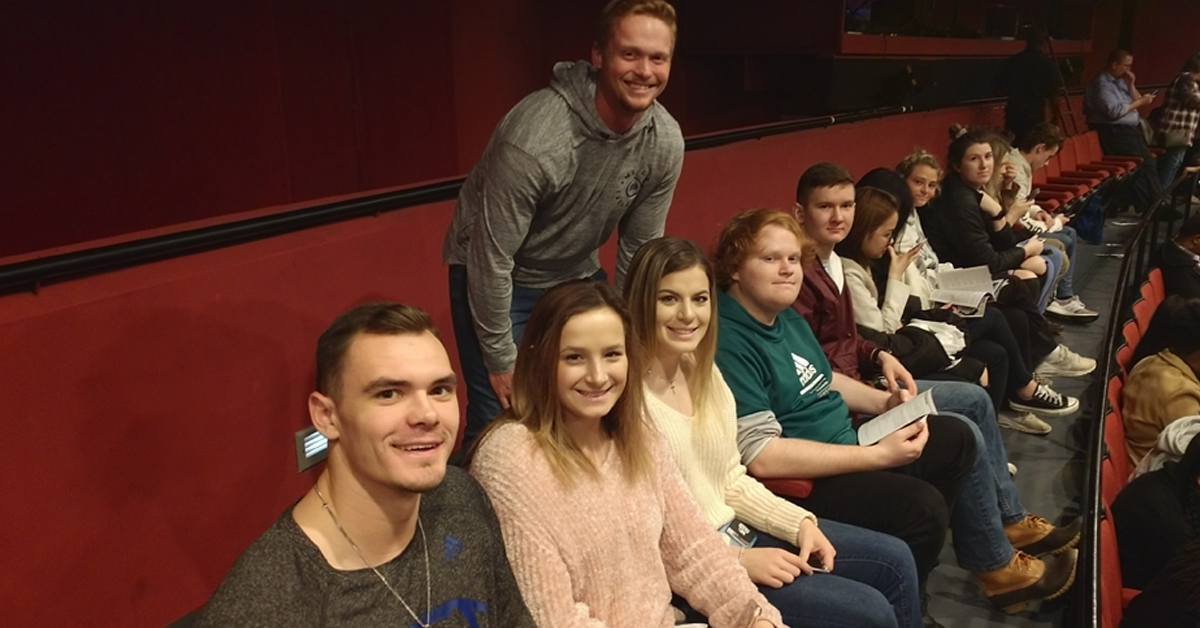Students learn ‘Wicked’ skills in this Intro to Lit class

Glinda the Good Witch of the North appears, and the munchkins soon learn a wicked witch’s fate, prompting a celebration in the Land of Oz.
It’s imagery most familiar with “The Wizard of Oz” can quickly recall. But what really happens before a wide-eyed Dorothy lands in the magical place from Kansas?
In “Wicked,” the Broadway musical, audiences go back in time and are introduced to Elphaba, the name of the Wicked Witch of the West, and the reimagined story of her and Glinda’s beginnings.
In Jonathan Butler’s Introduction to Literature course this semester, students are examining the witch figure in literature and other media from Shakespeare’s “Macbeth” to Elphaba’s turn in “Wicked.”
Learning Outside of the Classroom
As part of the course, they recently saw Broadway in Columbia’s “Wicked” at the Koger Center for the Arts.
“I’ve asked students to consider how ‘Wicked’ renders the Wicked Witch of the West sympathetic,” said Butler, coordinator in Athletic Tutoring and the Writing Center. “Margaret Hamilton’s brilliant performance as the witch in the 1939 film was a source of terror for generations, but Elphaba, as we know her now, has gone on to become a relatable, beloved heroine.
“This character has literally gone from scaring children to being one they might look up to as a role model. I think that’s fascinating, and I’ve asked students to identify the character traits that Elphaba shows us in ‘Wicked’ that make her someone we can look up to, and not just because she’s on a broom.”
Student Ava Ward has seen many Broadway musicals over the years and thought “Wicked” was among the best. Jacob Brasseur, who was apprehensive about whether or not he would enjoy it, found it was absolutely worth it.
“The story paired with visual effects and music was very memorable,” Brasseur said.
Other students like Trey Hawk were able to see a Broadway show for the first time. “I would especially like to thank the English Department as a whole for helping to give our class this opportunity,” Hawk said.
Magical Skill of Meaning
English students are developing critical reading, interpretive and research skills in the course. They’ll also take away the magical skill of shaping meaning. Butler says taking responsibility for meaning is what the liberal arts education is all about.
“Students are trained to do their own research, synthesize their findings and come to their own understanding of diverse topics,” he said.
“The alternative would be to accept someone else’s narrative uncritically. As the story of an outsider who dares to defy the ‘truth’ of an unjust authority, and who is unjustly slandered for taking a stand, ‘Wicked’ is a perfect text for thinking critically about our own responsibilities with regard to meaning and how we receive narratives both in and out of the classroom.”
The witch archetype in culture and popular media served as inspiration for the course along with “Circe” by Madeline Miller. Preston Robinette, a member of Butler’s Writing Center staff, suggested the novel to Butler.
“‘Circe’ is the first witch in western literature and the source of the archetype — she’s a powerful, independent woman that we originally encountered in a story, Homer’s “Odyssey,” that isn’t exactly sympathetic to her perspective,” he said. “She’s Elphaba’s big sister, so to speak.”
‘Wicked’ as a Central Text
Even if a person hasn’t directly engaged with “Wicked” or “The Wizard of Oz,” Butler says the Wicked Witch of the West, or Elphaba, may still inform their understanding of all the other witches. She somewhat acts as a template for them in general.
“The Wicked Witch of the West is the most iconic witch in our popular media,” he said.
“Even though there’s more than one witch in that story, if we just say ‘the witch,’ there’s no doubt about which witch we’re talking about. When you see a witch costume on Halloween, it’s probably going to look like Elphaba.
“The witch has gotten to become a hero in the last couple of decades thanks to ‘Wicked’ and the novel by Gregory Maguire that inspired it, and that makes ‘Wicked’ a central text for this class because the story of our relationship with Elphaba is also the story of our culture’s regard, or disregard, for powerful women and outsider perspectives in general.”
